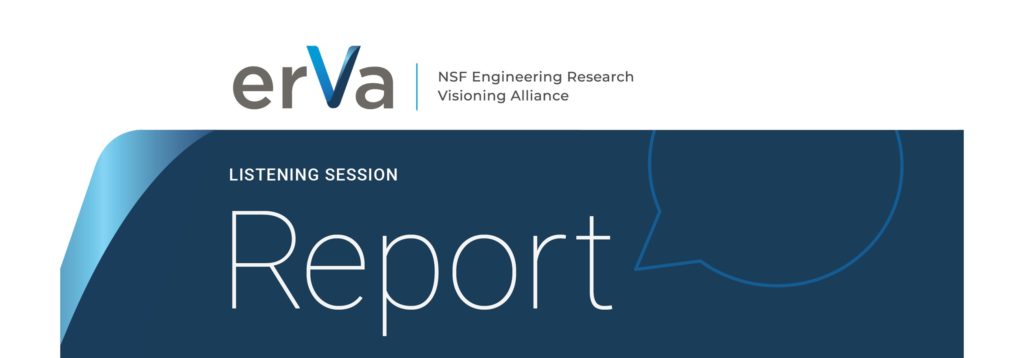Co-Hosted by The Pennsylvania State University | August 15, 2022

The Engineering Research Visioning Alliance (ERVA) empowers the engineering community to identify nascent opportunities and priorities for engineering-led, innovative, high-impact, cross-domain research that addresses national, global, and societal needs. As a National Science Foundation (NSF)-supported initiative, ERVA is committed to obtaining continuous input and feedback on contemporary engineering research priorities and future directions.
The aim of this in-person listening session, co-hosted by The Pennsylvania State University College of Earth and Mineral Sciences (Penn State), was to identify specific fundamental research areas within the theme that are nascent or require additional exploration, have the potential for the greatest return on investment, and are ripe for the engineering research community to lead. Academic, corporate, and nonprofit practitioners and thought leaders convened to share their insights. Download the report and share with colleagues.
PARTICIPANTS
Invited multi-disciplinary researchers from industry, government, academic, and nonprofits convened to discuss issues relevant to the critical minerals supply chain with the goal of advancing these conversations toward future bold, transformative engineering ideas. Penn State provided guidance through a task force to structure the topic areas for discussion.
LISTENING ROUNDTABLE DISCUSSION SUMMARY
- Resource identification and characterization methods for reliable estimation of feedstocks and unconventional sources in recycling of mineral industry and electronic wastes.
Common themes discussed by participants:
- Integrated mesh supply networks
- Tagging materials
- Removal of radioactive materials
- Effective management of electronic wastes
- Sensors / AI
Original ideas brought forward:
- Real-time decision-making/assaying based on material composition throughout the supply chain.
- The need for revolutionary technologies and approaches through the entire extraction/separation supply chain. Examples include ionic liquids and the need to synthesize a low-cost, environmentally friendly alternative.
- Value creation from all components of resource waste streams to promote a circular economy.
- Accelerated development of “long-term” separation technologies (i.e., chemical-less, photochemical, and metallothermic techniques).
- Development of a heap-leach approach to concentrate various critical minerals from waste piles. This is similar to gold heap-leach.
- Environment-friendly extraction and separation technologies
2. Environment-friendly extraction and separation technologies
Common themes discussed by participants:
- LCA-TEA informed pilot-scale processes
- Modular platforms for separation processing
- Precision in-situ mining
- Bio-based extraction technologies
Original ideas brought forward:
- Bottlenecks in green technologies are attributed to a lack of funding. Only a few companies are interested in developing new technologies.
- Encourage the end-consumer towards more green products by providing enhanced products with additional features compared to what is already available.
- Bottlenecks in green technologies are attributed to a lack of funding. Only a few companies are interested in developing new technologies.
- Encourage the end-consumer towards more green products by providing enhanced products with additional features compared to what is already available.
- Engineering scale-up and commercial project development
3. Engineering scale-up and commercial project development
Common themes throughout participant responses:
- Addressing gaps in thermodynamic data
- Development of materials for severe/harsh conditions
- Life-cycle analysis and outreach
- Need for transformational solid liquid separation methods
Original ideas brought forward:
- Standardization of product components to re-use instead of recycle. (i.e., ceramic magnets of common size).
- A community-based, turnkey system for consumer electronic recycling and reclamation of critical minerals. These systems should be modular, where “cartridges” can be swapped for desired critical minerals.
- The use of nuclear chemistry for critical minerals.
OVERALL KEY TAKEAWAYS
- There is a near-term need for bio-based extraction. Chemical and biology-based researchers should engage in research to improve critical materials screening and use biological methods to extract rare materials.
- Value creation should derive from all components of resource waste streams in a circular economy. Life-cycle analysis is needed for the entire life of minerals.
- Radical technologies and approaches are needed for extraction, separation, and supply chain processes (e.g., ionic liquids should be low cost and environmentally friendly).
ACKNOWLEDGMENTS
Organizers: ERVA, Penn State College of Earth and Mineral Sciences
Organizing Committee: Lee Kump, Dean of the College of Earth and Mineral Sciences; Sarma Pisupati, Director of Center for Critical Minerals; Joseph Cotruvo, Associate Professor of Chemistry; Clive Randall, Director of Materials Research Institute; Edl Schamiloglu, ERVA co-PI.
Roundtable Participants: Grant Bromhal, U.S. Department of Energy (DOE); Thomas Lograsso, Critical Minerals Institute/DOE; Philip Keller, Energy Fuels Inc; and Dan Hayba, U.S. Geological Survey.
ABOUT ERVA
The Engineering Research Visioning Alliance (ERVA) is a neutral convener that helps to identify and develop bold and transformative new engineering research directions, directly supporting the nation’s ability to compete in a rapidly changing global economy. Funded by the National Science Foundation (NSF) Directorate for Engineering, ERVA is a diverse, inclusive and engaged partnership that enables an array of voices to impact national research priorities. The five-year initiative convenes, catalyzes, and empowers the engineering community to identify nascent opportunities and priorities for engineering-led innovative, high-impact, cross-domain research that addresses national, global and societal needs.